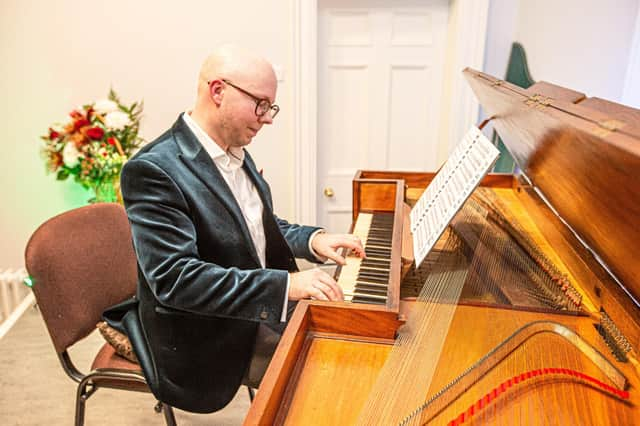Remembering Felix Yaniewicz, founder of the Edinburgh Musical Festival of 1815
This article contains affiliate links. We may earn a small commission on items purchased through this article, but that does not affect our editorial judgement.


It was a chance discovery that led to illuminating new insights into Edinburgh’s burgeoning music scene two centuries ago – and ultimately to an exhibition at the capital’s Georgian House, plus forthcoming concerts from the Scottish Chamber Orchestra. And it all revolved around one fascinating – and still slightly mysterious – figure: Felix Yaniewicz.
Josie Dixon is Yaniewicz’s great-great-great-great-granddaughter, and she remembers being vaguely aware of him during her childhood. “The portrait we have used to hang in my grandmother’s cottage, and we had a few other bits of memorabilia. I knew he was a violinist, and that he’d co-founded the first Edinburgh Music Festival.”
Advertisement
Hide AdAdvertisement
Hide AdWe’ll come back to those remarkable achievements. But it was while searching online that Dixon stumbled across a restored square piano – a pint-sized, rather delicate version of a conventional piano popular in the late 18th century – bearing her ancestor’s name. “It was an ad by the restorer Douglas Hollick. He’d been working on the instrument for a couple of years, but had not yet found a buyer.”
Dixon decided to buy the instrument – but also that it should have a permanent residence in Edinburgh, Yaniewicz’s home for the last three decades of his life. The rest is a story of crowdfunding, finding that permanent residence (the Polish House on Drummond Place) and, most importantly, a great deal of investigation into her illustrious ancestor.
And what Dixon discovered sheds new light on Edinburgh’s music scene about 200 years ago. Felix Yaniewicz was born (as Feliks Janiewicz) in Vilnius, then part of the Polish-Lithuanian Commonwealth, first working at the Polish Royal Chapel in Warsaw, then travelling to Vienna (where he probably met Haydn and Mozart) and further on to Paris, where he was forced to flee the violence of the French Revolution. He ended up virtually a refugee in London, where he made a name for himself as a performer, composer, instrument dealer and eventually co-founder of the Philharmonic Society, moving via a stop-off in Liverpool to Edinburgh, where he co-founded the city’s first ever Musical Festival way back in 1815. Yaniewicz lived at 84 Great King Street – where he’s immortalised by a plaque – and is buried in Warriston Cemetery.
What Yaniewicz discovered in Edinburgh, however, was “an already thriving musical community”, explains Brianna Robertson-Kirkland, lecturer in historical musicology at the Royal Conservatoire of Scotland. “There were regular concerts happening in Corri’s Rooms, which were between the top of Broughton Street and Leith Walk, and at St Cecilia’s Hall, and a rival concert series was set up at the Assembly Rooms. But what Yaniewicz did was to focus this activity into one place.”
That inaugural Edinburgh Musical Festival that Yaniewicz co-founded took place across four days in autumn 1815, with grand choral works (including Handel’s Messiah and Haydn’s Creation) in morning concerts in the Parliament House, plus lighter fare of vocal music and orchestral overtures at Corri’s Rooms in the evenings.
It’s significant, and a clear parallel with today’s International Festival, that so much of Edinburgh’s early musical life relied on immigrant musicians. “Music was Yaniewicz’s passport,” explains Dixon, “and it enabled him to come here and be entrepreneurial. At this juncture in Brexit Britain, it seems enormously important to understand what our nation’s musical life owes to that freedom of movement.”
“What I love about researching 18th-century musical culture, particularly in Edinburgh,” continues Robertson-Kirkland, “is that you see musicians – like Yaniewicz and others – who come to Edinburgh to give concerts, but then decide to stay, and they’re welcomed into the city and integrated into the city’s musical life.”
Advertisement
Hide AdAdvertisement
Hide AdRobertson-Kirkland herself gives a lecture and song recital as part of the Georgian House’s Yaniewicz events in August and September, which also include a talk by Armando Iannucci on music and migration in Scotland. Looking further ahead, there’s a chance to hear Yaniewicz’s own Violin Concerto No. 3 in a performance by Edinburgh violinist Colin Scobie and the SCO, alongside other music – classical and traditional – from around the same time. You can’t help but feel it’s a crucial time to rediscover and recognise just how much Edinburgh’s music scene has depended on international figures who decided to make the Scottish capital their home.
Music and Migration in Georgian Edinburgh: the Story of Felix Yaniewicz is at the Georgian House, Charlotte Square, Edinburgh until 22 October 2022, with related talks and recitals in August and September, www.nts.org.uk/visit/places/georgian-house. The SCO plays Yaniewicz’s Violin Concerto No. 3 in Dumfries, Edinburgh and Glasgow from on 7-9 December, www.sco.org.uk